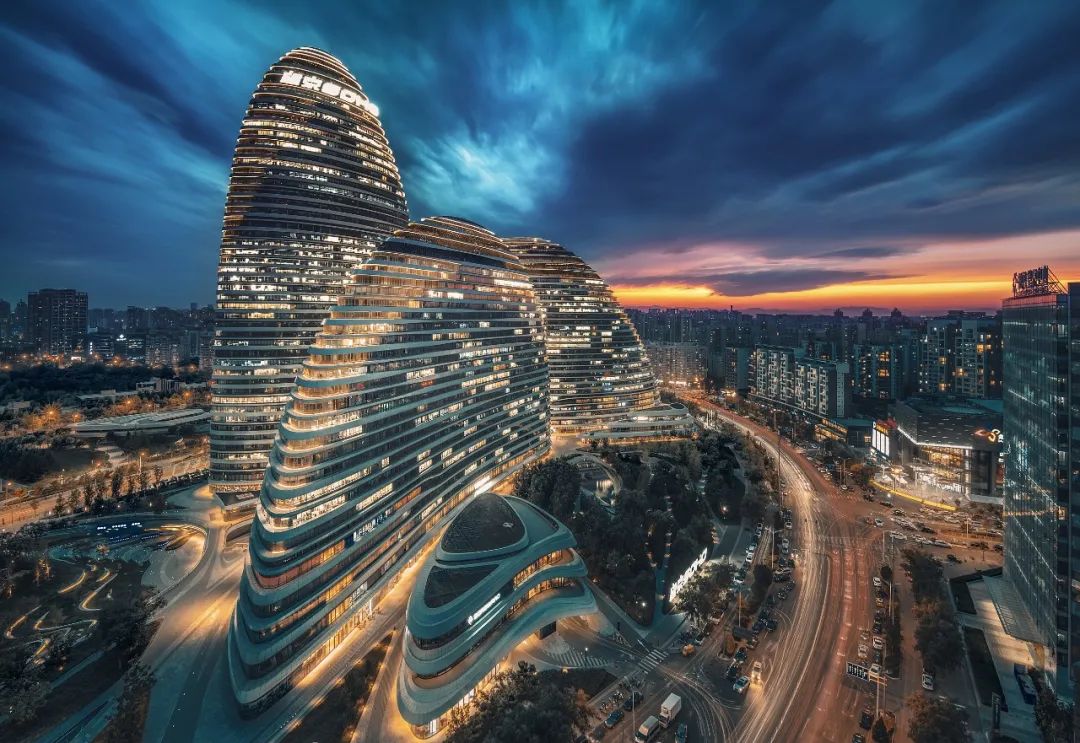

Beijing Internet Content Industry Map

In Beijing, there is a kind of vitality called the Internet; there is a kind of struggle called 996; there is a kind of twin job that never requires sleeping, called coding code and coding word.
As a representative of "Vibrant Beijing", Beijing's Internet industry "proudly ranks first in the country".In 2019, there were 18 related companies in this industry in Beijing with revenue exceeding 10 billion, accounting for 30% of the top 100 companies in the same industry nationwide. The software and information services industry achieved revenue of 1,346.42 billion yuan, accounting for 23% of the country’s total.
These data come from the "2020 Beijing Software and Information Services Industry Development Report" released by the Beijing Municipal Bureau of Economy and Information Technology and others.
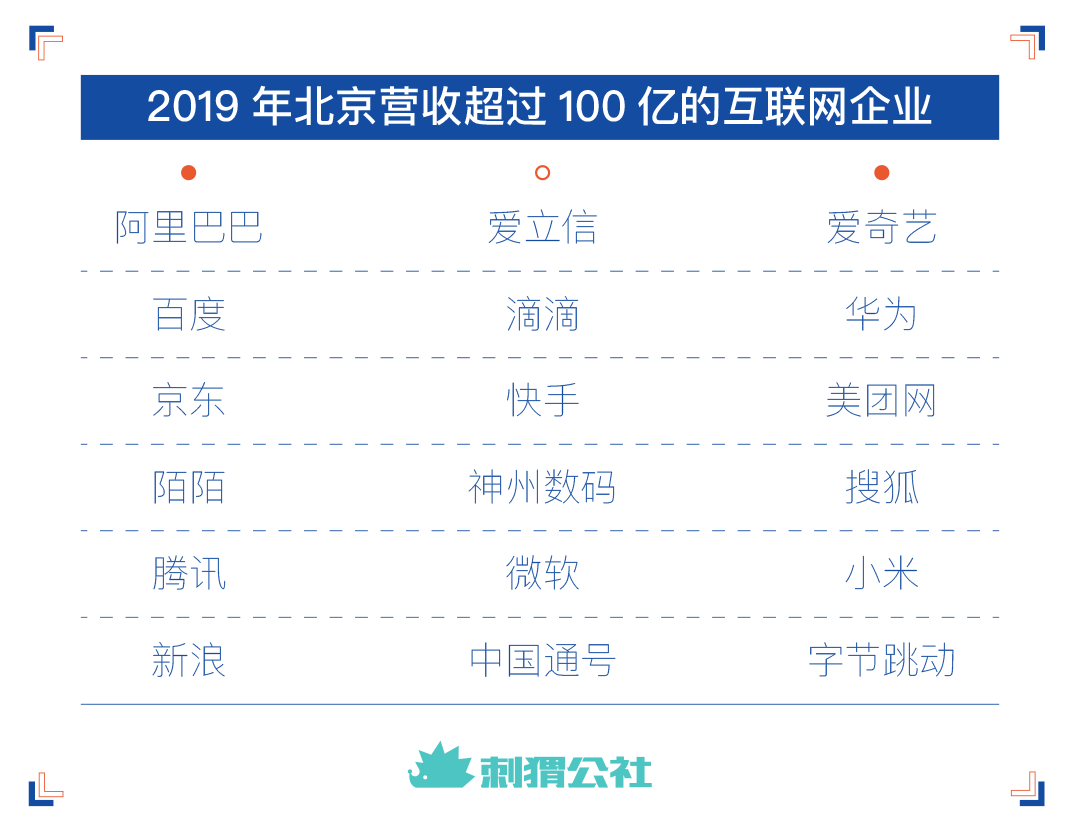 Data source: "2020 Beijing Software and Information Services Industry Development Report"
Data source: "2020 Beijing Software and Information Services Industry Development Report"
As an ancient capital, Beijing has a grand layout of four or nine cities. As an Internet capital, it can be divided into five major sections:Zhongguancun plate, Houchangcun plate, Wangjing plate, Yizhuang plate, Guomao-Dawang Road-Sihui plate.
Among them, JD.com is almost the only major player in the Yizhuang sector, so the only ones related to the Internet content industry are the other four sectors. Each of these four major sectors has its own characteristics.

Zhongguancun: still high ground
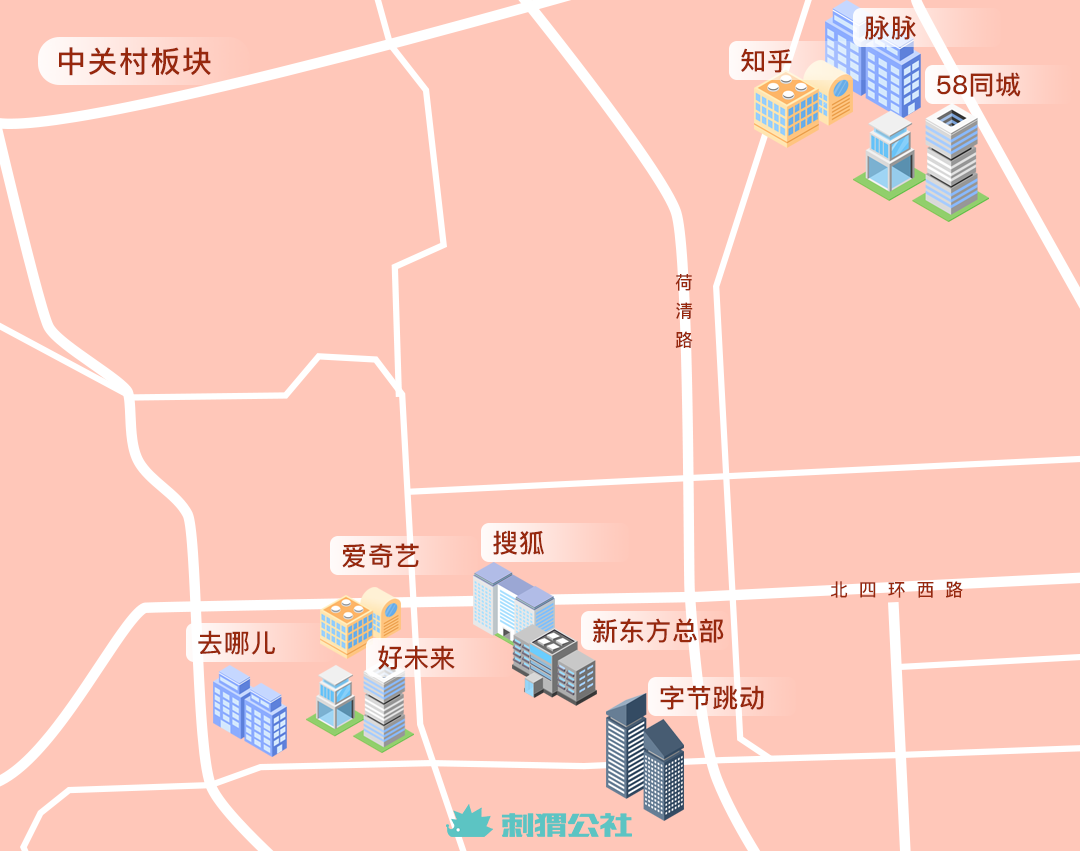
As the window of China's "new economy" back then, Zhongguancun was embraced by the two famous gardens of Old Summer Palace and Summer Palace. Now it has already become "successful and famous" and has become a business card.
Speaking of the history of Zhongguancun, 1998 may be recorded in the history books. The development of new media in China officially started this year, marking the beginning of 20 golden years.
In 1998, Wang Zhidong graduated from the Department of Radio Electronics of Peking University and is known as the "originator of the first generation of programmers in China". He is also the founder of "Sitong Lifang". That year, he met Jiang Fengnian, the founder of Huayuan Information, the largest Chinese website in North America. The two had a common idea: to build the largest Chinese website in the world.
In the same year, Sitong Lifang merged with Huayuan Information, and the new company was named "Sina", pioneering new media in China. Zhongguancun is the hometown of Sitong Lifang, and Sina naturally takes root here. However, in 2002, Sina moved from Zhongguancun to the CBD, and then moved back to the Ideal International Building in Zhongguancun in 2004. From this building, you can overlook the Peking University campus.
In 1999, Cao Guowei, who graduated from the Department of Journalism at Fudan University and had been in Silicon Valley for six years, joined Sina as vice president of finance. With his understanding and connections on Wall Street, he led the design of the VIE model, which led to the successful listing of Sina in April 2000, and the successful spin-off and listing of Weibo in 2014, becoming a social platform that still deeply affects the lives of Chinese people. . Zhongguancun had been the location of Sina's headquarters before moving to the Xierqi Sina Building in 2016.
In 1998, Zhang Chaoyang, who graduated from the Department of Physics of Tsinghua University, had already founded Atesin. In this year, he launched his brand website Sohu.com and changed its name to Sohu. Web advertising became Sohu's main source of profit.
In 2000, Sohu was listed on Nasdaq. Zhang Chaoyang was named one of the "Global 50 Digital Heroes" by Time Magazine. Since then, Sohu's news, video, and search operations have all flourished. Although the current development of Sohu is a bit "middle-aged", "the building is here and Sohu is here", which does not affect "Charles's sharing of good things" at all.
Zhang Chaoyang’s real estate investment philosophy allows Sohu to still stand in Zhongguancun. In 2006, Sohu used the cash reserves of 30% at that time to purchase some properties in the core area of Wudaokou and renamed it Sohu Internet Building. This building is not far from the east gate of Tsinghua University. In 2010, Sohu built its own Sohu Media Building in the core area of Zhongguancun.
In 1998, Zhang Chaoyang also met someone, Gu Yongqiang. In August of that year, at the Beijing International Hotel, Zhang Chaoyang originally wanted to find Gu Yongqiang, who was in the capital circle, to invest in Sohu.com. While talking, Zhang Chaoyang said to Gu Yongqiang, "Come to Sohu." Gu Yongqiang agreed, and his title was senior vice president and CFO.
In 2004, Koo Yongqiang resigned. In 2005, he founded Heyi Network and Youku the following year, ushering in the video era in China.
There is another person who left Sohu, Gong Yu. The real estate portal he founded in 1999, Focus.com, was acquired by Sohu in 2003, and he later joined Sohu as a senior executive. In 2010, Gong Yu founded iQiyi. In 2018, iQiyi was listed on Nasdaq. Now, iQiyi’s limelight has long overshadowed Youku’s. And Sohu has become a typical representative of "cultivating talents and bringing glory to others".
In 1998, Zhongguancun was still a mixture of courtyards and farmland. As the new economy gathered, Zhongguancun became the “new economy business card” of Beijing and even the whole country. However, with the development of the city, the area became narrow and expensive. Zhongguancun began to seek to expand its capacity and set up branches in various districts of Beijing. This once caused people to worry: Will the core area of Zhongguancun be "crowded away"?
However, there is no shortage of heroes in Feng Shui treasure land. In 2012, Zhang Yiming founded ByteDance in Zhongguancun, reviving the Zhongguancun sector.
In the eight years since its founding, ByteDance has never left Zhongguancun, from Jinqiu Home to Yingdu Building, to AVIC Plaza, and China Satellite Building.
Zhang Yiming recalled how difficult it was when he first started working at Jinqiu Homes: "I worked in a small private house. The conference room was only 5 square meters, and I could smell the cooking while working."
With the rapid development of ByteDance, Jinqiu Home has long been overcrowded. In 2013, ByteDance moved for the first time, from Jinqiu Home to Yingdu Building. In 2016, ByteDance moved for the second time, to the larger AVIC Plaza, still on Zhichun Road.
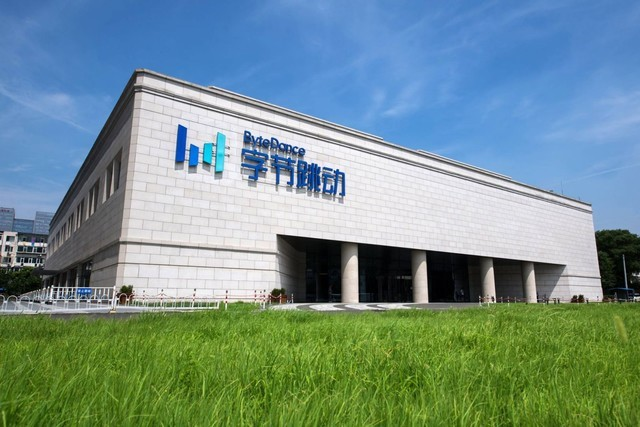 Source: Zhongguancun Online
Source: Zhongguancun Online
Zhang Yiming once explained his obsession with Zhongguancun in an internal letter: "Young people should live in the center of the city for work and life, even if the house is smaller (they should go out for more activities), there are more activities and exchanges in the city, and after get off work There’s no need to waste your time and precious energy squeezing on the subway afterwards.”
With the launch of Douyin, Xigua Video and Huoshan Video, ByteDance has become an important player in leading the short video field in China.
Looking back at Zhongguancun, in the Internet content industry, it has contributed a lot of spiritual food to the public such as online graphics, videos, short videos, variety shows, movies and dramas, and has profoundly affected the Chinese people's lifestyle. This is the real trend pioneer. .

Xi Er Banner: The Land of Fighting for Deer
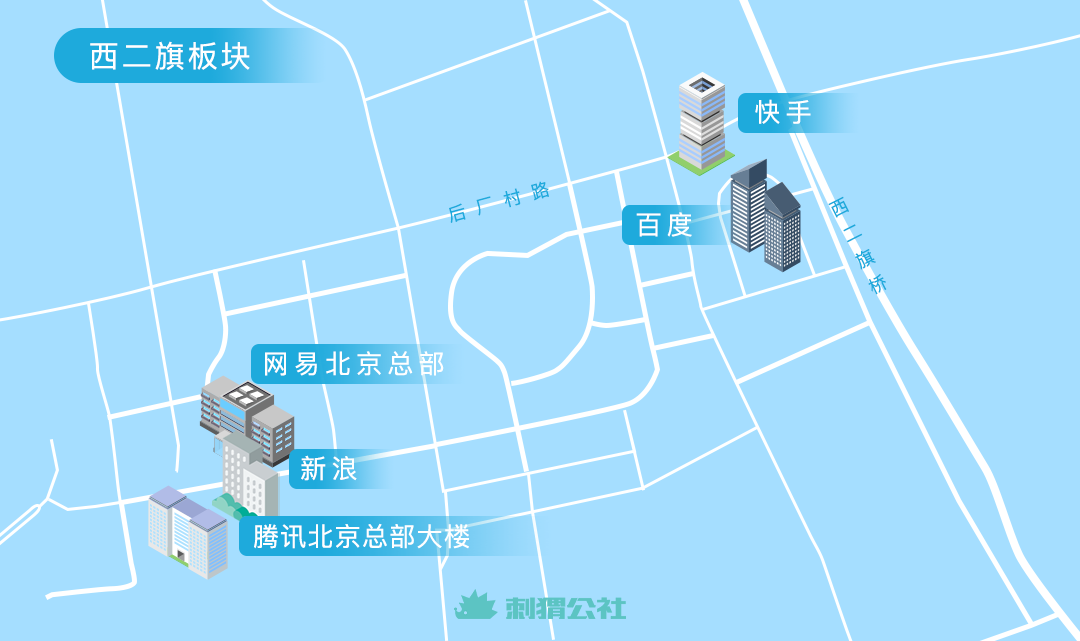 Cartography: Hedgehog Commune
Cartography: Hedgehog Commune
Around 2010, as rents in traditional areas in Zhongguancun soared, big names such as Baidu, NetEase, and Tencent moved northward and moved their headquarters or Beijing branches from Zhongguancun to Xierqi, Shangdi, and Xibeiwang.
Here, the coders are blowing the wind from the West Mountain, drinking the water from the Yanshan Mountain, and looking at the scenery of the imperial mausoleum. Everything is fine, but there is one thing they didn't expect. They originally came to "avoid the traffic jam," but unexpectedly they ended up "adding to the traffic jam." ".
In 2009, Baidu moved into the "Search Box" building, its new headquarters in Shangdi Science and Technology Park, covering an area of 90,000 square meters. Unexpectedly, it was quickly overcrowded. The Penghuan Building, Kuike Building, and First Space Building around Shangdi had to open their doors to welcome guests, causing congestion around them.
Five years later, the Baidu Technology Park, three main streets away from the Baidu Building, was completed. The design was inspired by the "∞" symbolizing infinity and the Möbius strip, which symbolized Baidu's limitless future. The cramped and congested space was greatly alleviated.
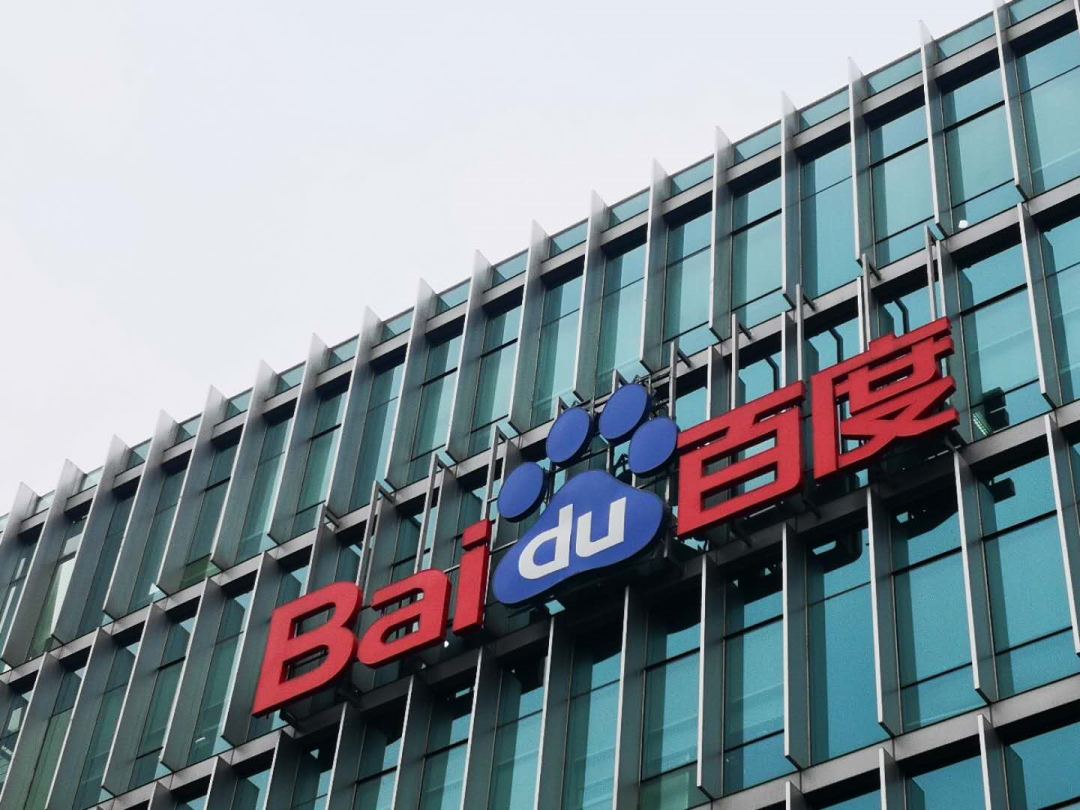
In 2016, Sina, which had been rooted in Zhongguancun for 20 years, decided to move north and move into the district, which became a landmark event at the time. Unexpectedly, thousands of people moved in in batches, causing local congestion to rise.
Li Tao, who has worked at Sina Weibo for 10 years, recalled: "When I first moved from Ideal Building, the Xibeiwang area was relatively smooth, and everyone joked that they had their 'first apartment' here. But it didn't take long for congestion to start. .”
"It takes 10 minutes to find a commuter bus from the Beibuwang subway. Shared bicycles are basically a grab. There are limited restaurants around, so I have to go to the crowded canteens of Baidu and NetEase."
However, what makes Li Tao happy is that since moving to "Northwest Prosperity", the market value of Weibo has exceeded 10 billion, 20 billion, and 30 billion US dollars, which has fulfilled the place name.
Also moving here is Goose Factory, which is not far from Baidu Technology Park and is the headquarters building of Tencent Beijing.
The building invested and built by Tencent covers an area of 330,000 square meters and has an investment of 1.8 billion. It is known as the largest single office building in Asia. Previously, Tencent’s headquarters in Beijing were Yinke Building and Sigma Building in Zhongguancun’s power circle, but there is no doubt that those two buildings are no longer able to accommodate Tencent’s territory in Beijing.
The story of Tencent moving into Xierqi is also a bitter history. I believe many people still remember the fire in Tencent’s Beijing headquarters in 2017. Sina employees ran to the rescue, NetEase employees immediately sent out the news, and Baidu employees watched from the window. This "joke", both true and false, has been passed down to this day.
Except for these "old Internet" people who were born in the 1990s, in this area, the one who has firmly held the "little C position in the limelight" of Xierqi Station in recent times is Kuaishou.
On December 24, 2018, Kuaishou’s headquarters moved from Wudaokou, the “Cosmic Center”, to six buildings in Xier Banner. The influx of “thousands” of Kuaishou employees directly paralyzed the narrow alleys in the nearby Houchang Village, causing exhaustion. It broke the hearts of all the Internet celebrities from all over the country.
However, in the history of Kuaishou moving, this is just a small scene. The biggest move was in 2015, when Kuaishou moved from the Wudaokou residential building Huaqing Jiayuan to the nearby TusTech Building in Tsinghua Science and Technology Park, and placed its logo on the top of the most prominent building in the center of the universe. At that time, Kuaishou only had about 20 employees, but its daily income exceeded 10 million, demonstrating its full entrepreneurial spirit and unlimited expectations for the future.
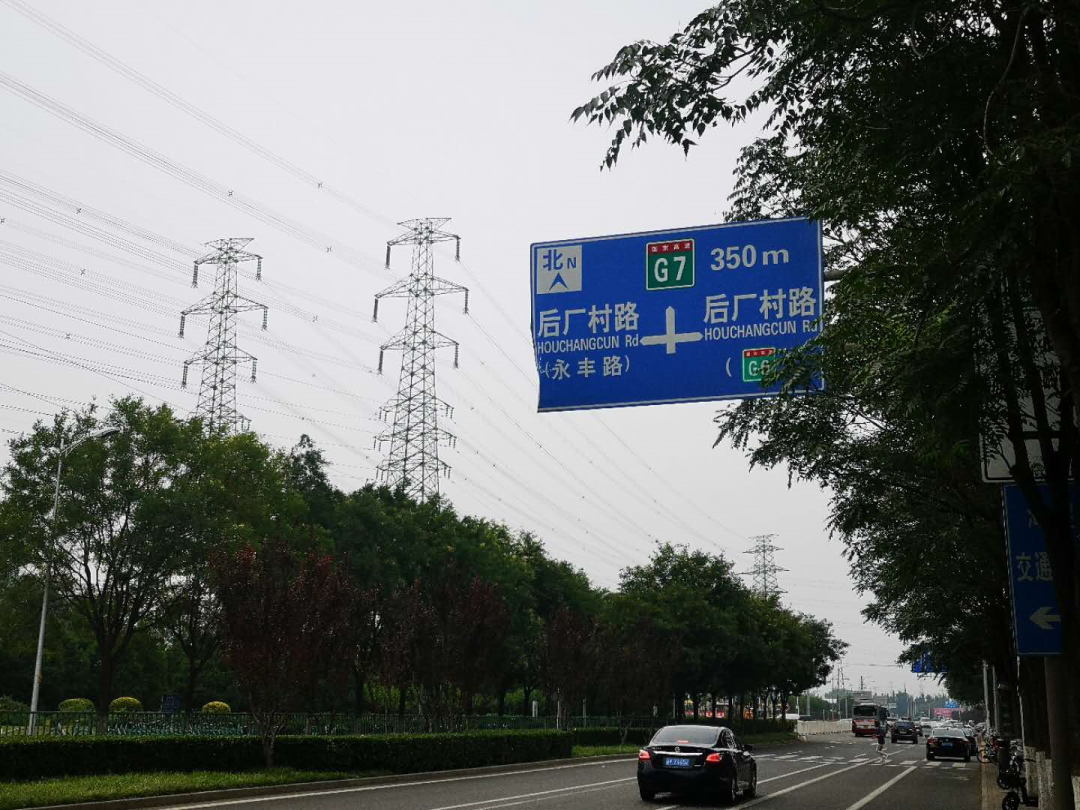
Different from other places, when building corporate headquarters in this area of Beijing, the historical context and natural landscape of three mountains and five gardens were taken into consideration, and a "garden ecological" park design was adopted. The pros and cons of this design are obvious.
Wandering here, you will quickly discover: Although the outside of the headquarters building is lined with green trees and the roads are straight, there is "no grass growing", and there are no traces of accommodation, services, and living facilities; inside the building, "all five organs are available", including a canteen, gym, and massage. Rooms, convenience stores, everything. It’s a typical “smart design” that tells you not to eat when you go out. 996 circulates in the building.
Now, with the arrival of Internet companies in batches and hundreds of thousands of code farmers "immigrating" here, Xierqi has become one of the new congestion points in Beijing.
Houchang villagers complained, "The congestion level on Houchang Village Road is highly consistent with the commuting schedule of these Internet companies. It is like the tide of people in Houchang Village. If it rains, they will not be able to move at all."
There is a saying that the biggest bottleneck restricting China's Internet is the traffic in Houchang Village.

Wangjing: Nothing to do with Feng Shui
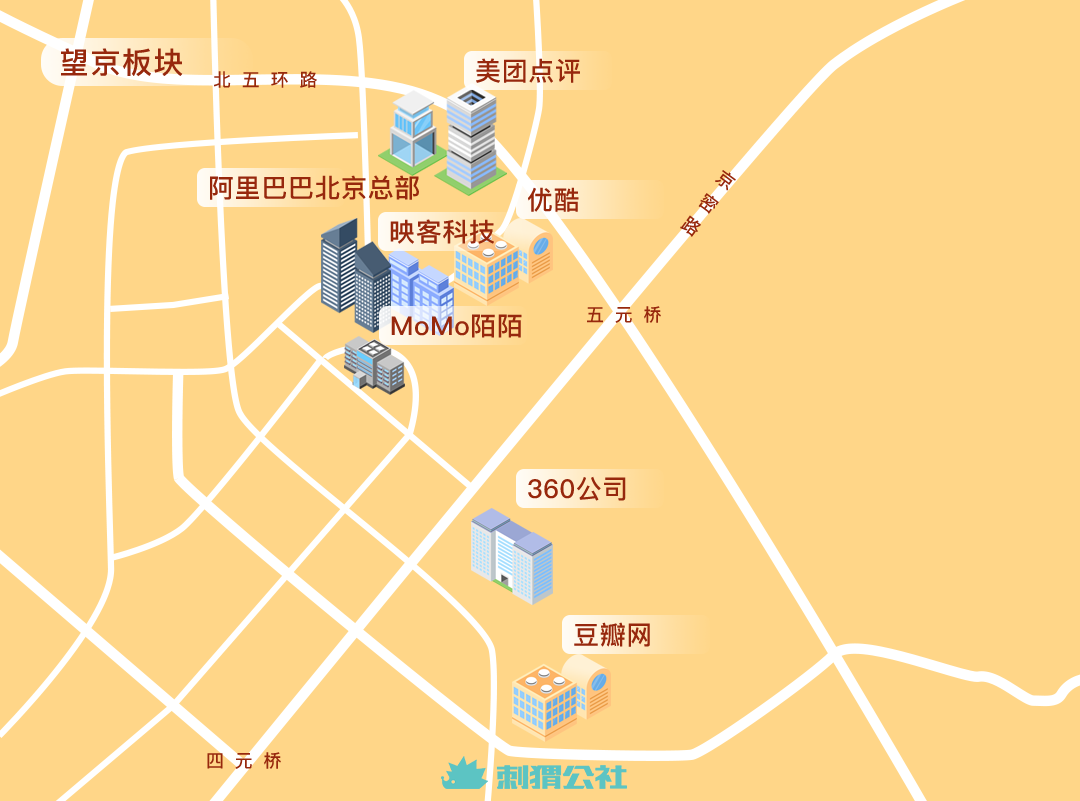
In the northeast corner of Beijing, half an hour from the airport, you can see three towers and a pineapple-shaped building. This is Wangjing, where foreign investment and the new Internet are booming.
This area used to be farmland, but development began in the 1990s. As a large number of foreign investors moved into Wangjing, it embarked on a path of rapid development.
Many battles have been witnessed here.
In 2010, Qihoo 360, a large manufacturer located in Jiuxianqiao, south of Wangjing, launched a "3Q war" spanning more than half of China with Tencent in Shenzhen. The "star products" of both parties have been "fighting each other" for four years and embarked on the road of litigation, which ultimately ended in 360's defeat.
Alibaba, which was headquartered in Hangzhou at the time, also joined the Internet struggle in Beijing. The chosen location was Wangjing, not far from the headquarters of Meituan, and echoing the east and west of Tencent's Beijing headquarters.
In December 2019, Alibaba Beijing Headquarters Park started construction in the Wangjing area, with an investment of 6.4 billion yuan and a construction area of 470,000 square meters. When completed in 2024, it will become a major landmark in Wangjing.
This place has also been troubled by "feng shui".
In December 2014, Momo, which Tang Yan had founded for three years, was listed on Nasdaq. "Landlord" Pan Shiyi couldn't hide his excitement and posted on Weibo: "Another listed company has appeared. The place (Wangjing SOHO, Momo's headquarters was here at the time) has good feng shui and is suitable for the development of Internet companies."
Unexpectedly, at the beginning of 2019, the self-media "Shenggunju" recently published an article titled "The overall situation of Feng Shui in Wangjing SOHO, Beijing, is the Internet a "Waterloo"? 》 article, in the next few years, the plot developed in the opposite direction.
Revenue is declining, profits are cut in half, and users are sideways. Momo, which has been on the market for 5 years, is silently stalling. Other companies were not much better. Station A was once in trouble and was sold to Kuaishou; the matchmaker "Lily" repeatedly exposed crises; Touch Technology, which once rented two floors in Wangjing SOHO, fell into decline.
In 2019, Mimeng, who was once in the limelight, reached a turning point because of problematic articles under his official account. Apologies, closures, etc. could not stop criticism from public opinion for "editing" and "inciting emotions". Finally, in February of that year, it had to be announced that the account would be completely banned.
On March 8 of the same year, Panda Live, which Wang Sicong strongly promoted and was not short of money, left only the word "bye" on Weibo, announcing the complete end of Panda Live's four-year short life.
There are also people who are still persisting in Wangjing.
Inke, which moved from Wangjing SOHO to the Greenland Center next door, went public. Although it has changed from "the first live-streaming stock in Hong Kong" to a "one-yuan penny stock" in recent years, Hunan boss Feng Yousheng is still young and is focusing on live broadcasting and social networking. , looking for new growth.
Momo acquired Tantan and quietly survived and grew in Tencent’s social meat grinder.
Douban, on the other hand, remains as Buddhist as ever, hiding its capabilities and biding its time, becoming a school of its own. Not long ago, there was a change in the shareholders of Douban's main company. Public opinion thought that Abei had withdrawn from Douban, but it was later discovered that it was a false alarm.
Some people say that Wangjing has poor Feng Shui. If you start a business here, 9 out of 10 will die. But some people say that successful people will succeed wherever they go. And people who fail always have to find a reason.

Guomao-Dawang Road-Sihui Section: The Flower of Media
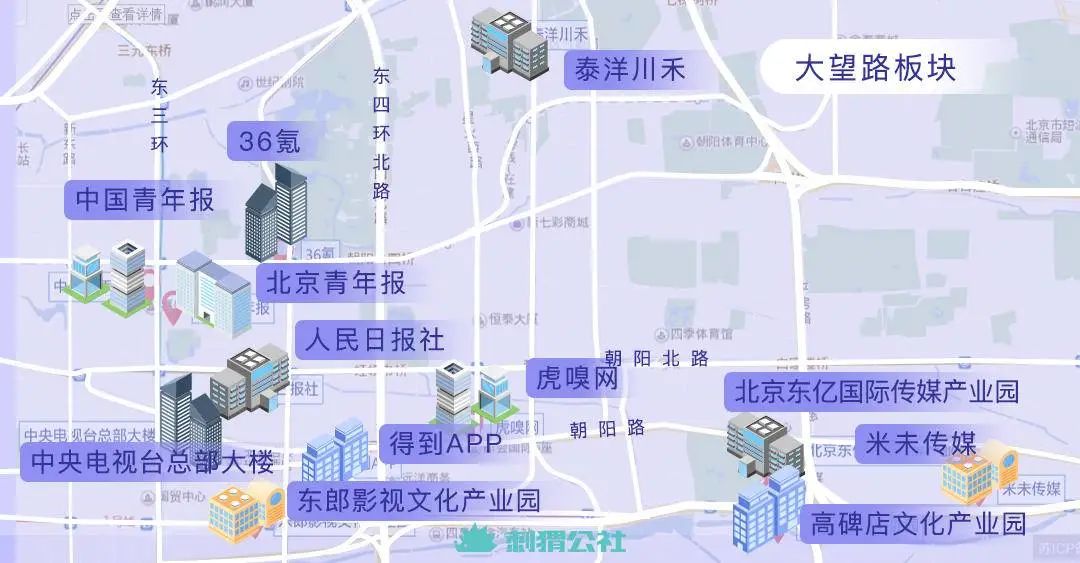 Cartography: Hedgehog Commune
Cartography: Hedgehog Commune
The Beijing International Trade Center-Dawang Road-Sihui section is famous for its media.
CCTV and People's Daily, two major "state-owned" media, are located at the "golden intersection" of the East Third Ring Road and Jianguomenwai Street; China Youth Daily, Beijing Youth Daily, Caixin Media, People Magazine and other media are located at the "golden intersection" of the East Third Ring Road and Jianguomenwai Street. On the other hand, the three leading media in technology media, 36kr, Huxiu and Titanium Media, were all stationed between the East Third Ring Road and the East Fourth Ring Road; a number of film and television, entertainment, live broadcast, knowledge payment, media and other types of enterprises, They set up camps on both sides of the Tonghui River.
On November 29, 2014, "Qi Pa Shuo Season 1" became an instant hit, and host Ma Dong ushered in another spring in his career. Before this, the audience thought of Ma Dong as the queen of a famous family and the wise character in "If You Have Something to Say", they never thought that he could also be fashionable and fun.
In June 2016, media man Lao Yang came to visit Mi Wei’s former headquarters at the East Seventh Gate of Chaoyang Park. Walking into a small, inconspicuous building, in the cramped conference room where people were waiting, what they saw was leftover lunch boxes piled on the floor. But even though the night is dark, the young people coming and going are still full of energy, fashionable and jumping. Posted on the wall are photos of Ma Dong and the whole team getting wet during the Southeast Asian team building.
 Source: Screenshot of Sina Weibo @东七门
Source: Screenshot of Sina Weibo @东七门
With the success of "Qi Pa Shuo", the narrow Dongqimen can no longer accommodate the expanded team. Now, Mi Wei has moved to the more spacious Communication University area outside the East Fifth Ring Road, and has integrated into the Dawang Road-Gaobeidian-Sihui cultural and creative industrial belt in Chaoyang, Beijing.
Taiyang Chuanhe rose almost at the same time as Miwei. Now it is located between the Fourth and Fifth Ring Roads in the Northeast, not far from Chaoyang Park.
In 2016, Jiang Yilei, who graduated from the directing department of the Central Academy of Drama, made several self-written and acted short videos at home, which were widely circulated on the Internet. With a Taiwanese accent and a changed voice, the smell of Northeastern slag made everyone instantly remember the girl named Papi Jiang. With an average of more than 200,000 clicks per Weibo post, she has become an "Internet celebrity", and her old classmate Yang Ming also shares the credit behind this.
Yang Ming founded the artist management company Taiyang Chuanhe a year ago and signed contracts with Yang Ying, Zhou Dongyu, Chen He, etc. After papi became popular, papi and Yang Ming jointly established the MCN organization papitube, becoming a representative MCN organization in the industry.
The Gaobeidian-Sihui area in Tonghui Henan is home to the largest number of film and television-related industry companies in Beijing. A few years ago, when the film and television industry was booming, the small Lu Chuan shops on the street were brightly lit, and cultural figures and coal bosses would talk loudly and discuss projects here. It’s a pity that due to the epidemic, there is no summer in Gaobeidian.
Some people say that the reason why the Dawang Road-Gaobeidian-Sihui area is "a spring of literary thoughts" is because the water here is good. The Tonghui River, which transported grain in ancient times, flowed from west to east through the Yuan, Ming and Qing dynasties. In addition, there is a large green lung in Chaoyang Park, which continuously outputs fresh oxygen.

Some people also say that Guomao ranks at the top of the pyramid with "prosperity" among the districts in Beijing. It is home to the Beijing CBD, densely populated by Fortune 500 companies, with no shortage of high-tech companies, and Internet companies springing up like mushrooms after a rain. Capital flows, talent flows, information flows, and international standards converge here, providing the most fertile soil for the development of cultural and creative industries.
In April 2019, the WeChat public account "Chaoyang United Front" revealed that there are currently about 225,000 new media practitioners in Chaoyang District, accounting for 27% of the total number of new media practitioners in Beijing. It has become a new media center in Beijing and even the country.
It can be seen from the above that Beijing’s four major content industry sectors occupy the four corners of Beijing’s southeast, northwest and northwest. Thousands of companies, giant unicorns abound. There are all kinds of talents, from pictures and texts to long and short videos, from social networking to live broadcasts and games, there is always someone who works harder and is better than you.
Beijing controls half of the people's entertainment world, and this is China's entertainment center.
(The author Shi Can also contributed to this article.)
